北师大版(2019)选择性必修一:Unit2 Success 单元语法专题——(1)动词-ing形式 课件(48张ppt)
文档属性
| 名称 | 北师大版(2019)选择性必修一:Unit2 Success 单元语法专题——(1)动词-ing形式 课件(48张ppt) |  | |
| 格式 | ppt | ||
| 文件大小 | 783.5KB | ||
| 资源类型 | 教案 | ||
| 版本资源 | 北师大版(2019) | ||
| 科目 | 英语 | ||
| 更新时间 | 2021-09-22 23:34:24 | ||
图片预览

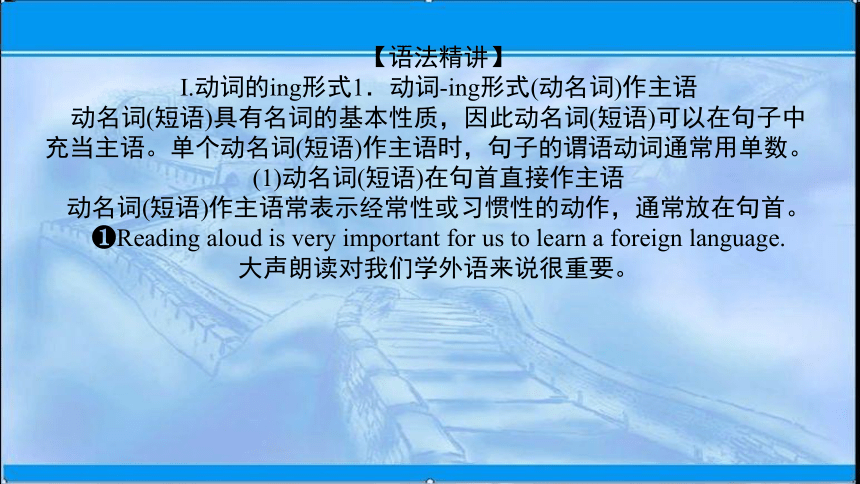
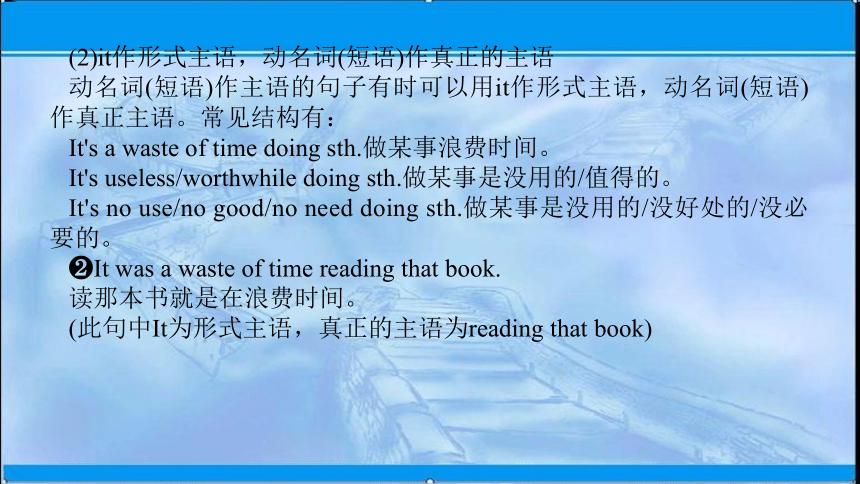
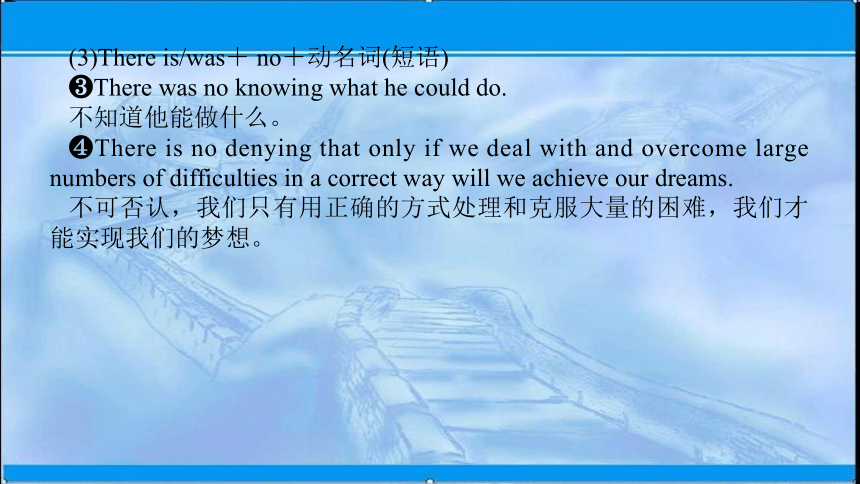
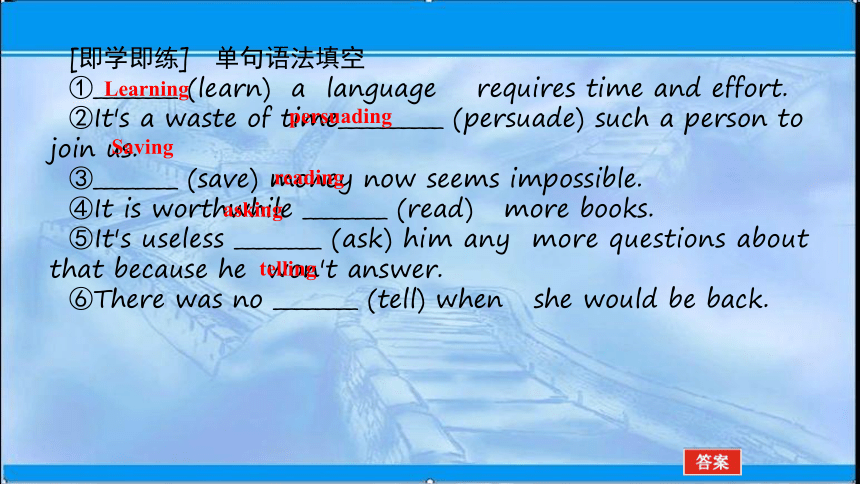
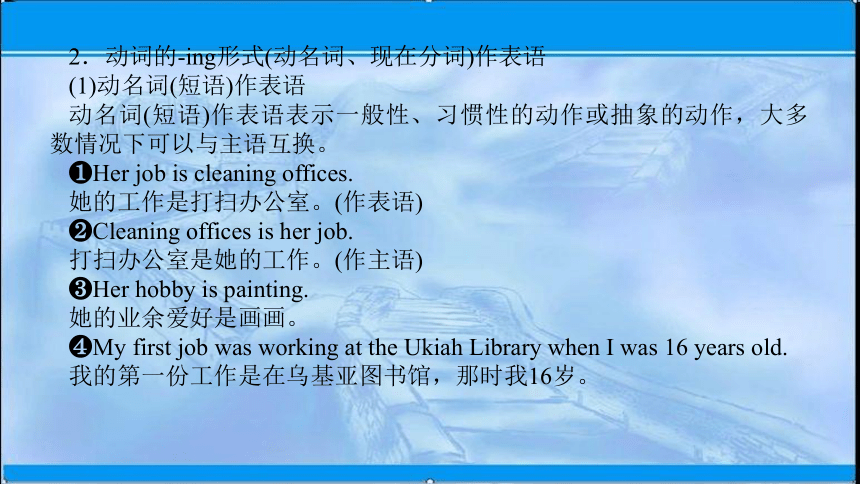
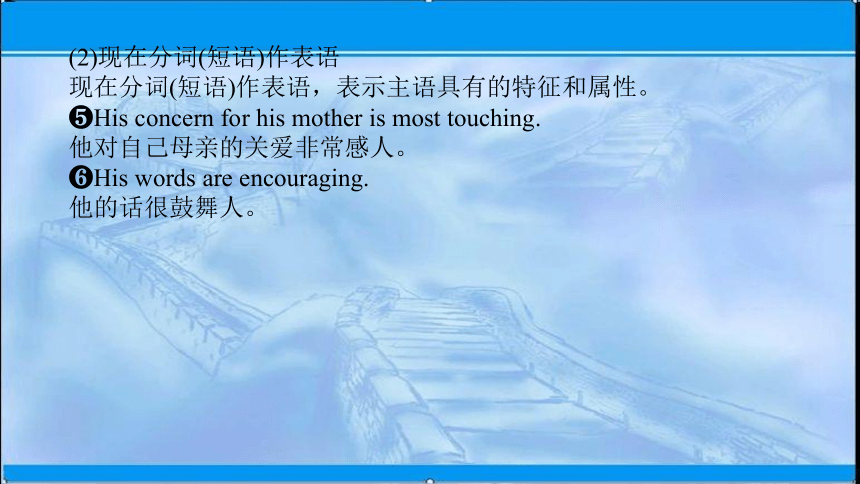
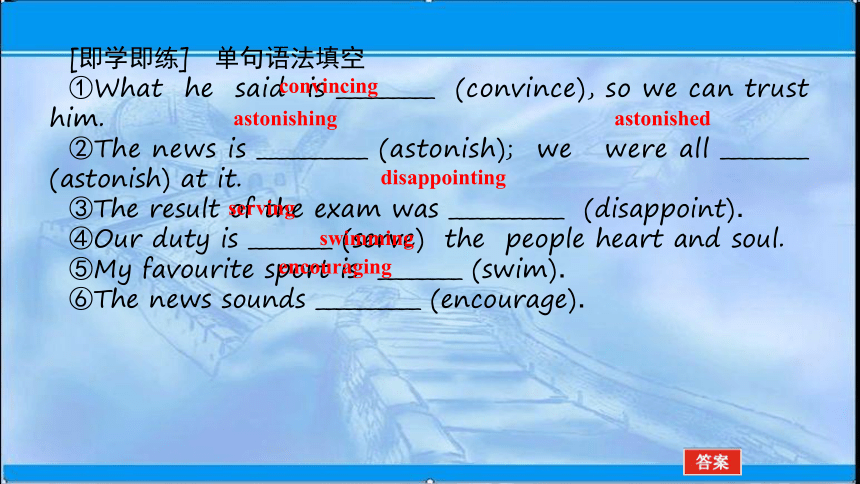
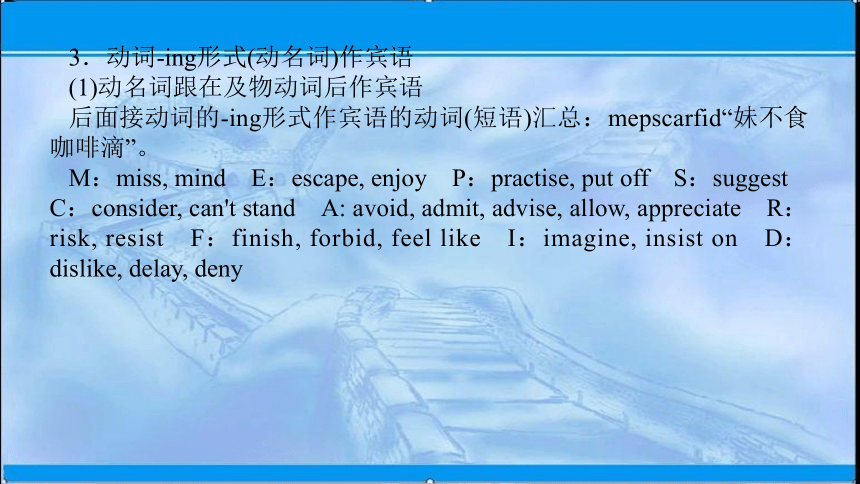
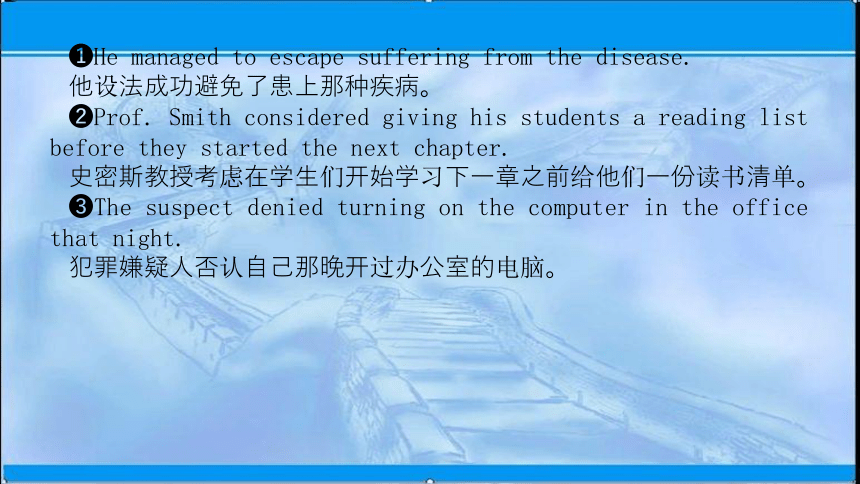
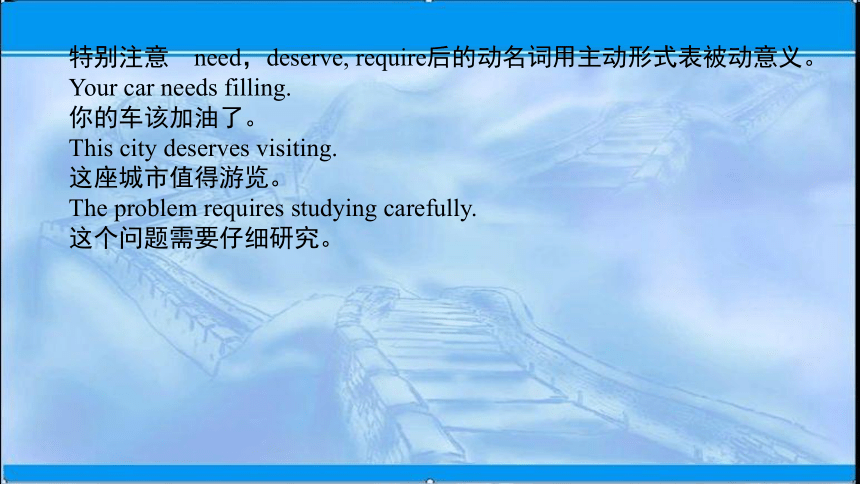
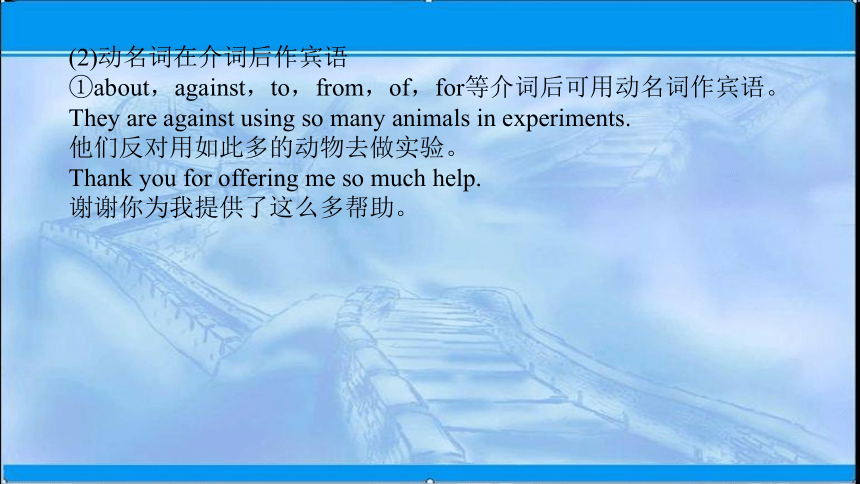
文档简介
(共48张PPT)
Part
Ⅵ 单元语法专题——(1)动词-ing形式
(动名词)作主语、表语和宾语 (2)冠词
【语法精讲】
Ⅰ.动词的ing形式1.动词-ing形式(动名词)作主语
动名词(短语)具有名词的基本性质,因此动名词(短语)可以在句子中充当主语。单个动名词(短语)作主语时,句子的谓语动词通常用单数。
(1)动名词(短语)在句首直接作主语
动名词(短语)作主语常表示经常性或习惯性的动作,通常放在句首。
?Reading
aloud
is
very
important
for
us
to
learn
a
foreign
language.
大声朗读对我们学外语来说很重要。
(2)it作形式主语,动名词(短语)作真正的主语
动名词(短语)作主语的句子有时可以用it作形式主语,动名词(短语)作真正主语。常见结构有:
It's
a
waste
of
time
doing
sth.做某事浪费时间。
It's
useless/worthwhile
doing
sth.做某事是没用的/值得的。
It's
no
use/no
good/no
need
doing
sth.做某事是没用的/没好处的/没必要的。
?It
was
a
waste
of
time
reading
that
book.
读那本书就是在浪费时间。
(此句中It为形式主语,真正的主语为reading
that
book)
(3)There
is/was+
no+动名词(短语)
?There
was
no
knowing
what
he
could
do.
不知道他能做什么。
?There
is
no
denying
that
only
if
we
deal
with
and
overcome
large
numbers
of
difficulties
in
a
correct
way
will
we
achieve
our
dreams.
不可否认,我们只有用正确的方式处理和克服大量的困难,我们才能实现我们的梦想。
[即学即练] 单句语法填空
①________
(learn)
a
language
requires
time
and
effort.
②It's
a
waste
of
time__________
(persuade)
such
a
person
to
join
us.
③________
(save)
money
now
seems
impossible.
④It
is
worthwhile
________
(read)
more
books.
⑤It's
useless
________
(ask)
him
any
more
questions
about
that
because
he
won't
answer.
⑥There
was
no
________
(tell)
when
she
would
be
back.
Learning
persuading
Saving
reading
asking
telling
2.动词的-ing形式(动名词、现在分词)作表语
(1)动名词(短语)作表语
动名词(短语)作表语表示一般性、习惯性的动作或抽象的动作,大多数情况下可以与主语互换。
?Her
job
is
cleaning
offices.
她的工作是打扫办公室。(作表语)
?Cleaning
offices
is
her
job.
打扫办公室是她的工作。(作主语)
?Her
hobby
is
painting.
她的业余爱好是画画。
?My
first
job
was
working
at
the
Ukiah
Library
when
I
was
16
years
old.
我的第一份工作是在乌基亚图书馆,那时我16岁。
(2)现在分词(短语)作表语
现在分词(短语)作表语,表示主语具有的特征和属性。
?His
concern
for
his
mother
is
most
touching.
他对自己母亲的关爱非常感人。
?His
words
are
encouraging.
他的话很鼓舞人。
[即学即练] 单句语法填空
①What
he
said
is
_________
(convince),
so
we
can
trust
him.
②The
news
is
__________
(astonish);
we
were
all
________
(astonish)
at
it.
③The
result
of
the
exam
was
___________
(disappoint).
④Our
duty
is
________
(serve)
the
people
heart
and
soul.
⑤My
favourite
sport
is
________
(swim).
⑥The
news
sounds
__________
(encourage).
convincing
astonishing
astonished
disappointing
serving
swimming
encouraging
3.动词-ing形式(动名词)作宾语
(1)动名词跟在及物动词后作宾语
后面接动词的-ing形式作宾语的动词(短语)汇总:mepscarfid“妹不食咖啡滴”。
M:miss,
mind E:escape,
enjoy P:practise,
put
off S:suggest C:consider,
can't
stand A:
avoid,
admit,
advise,
allow,
appreciate R:risk,
resist F:finish,
forbid,
feel
like I:imagine,
insist
on D:dislike,
delay,
deny
?He
managed
to
escape
suffering
from
the
disease.
他设法成功避免了患上那种疾病。
?Prof.
Smith
considered
giving
his
students
a
reading
list
before
they
started
the
next
chapter.
史密斯教授考虑在学生们开始学习下一章之前给他们一份读书清单。
?The
suspect
denied
turning
on
the
computer
in
the
office
that
night.
犯罪嫌疑人否认自己那晚开过办公室的电脑。
特别注意 need,deserve,
require后的动名词用主动形式表被动意义。
Your
car
needs
filling.
你的车该加油了。
This
city
deserves
visiting.
这座城市值得游览。
The
problem
requires
studying
carefully.
这个问题需要仔细研究。
(2)动名词在介词后作宾语
①about,against,to,from,of,for等介词后可用动名词作宾语。
They
are
against
using
so
many
animals
in
experiments.
他们反对用如此多的动物去做实验。
Thank
you
for
offering
me
so
much
help.
谢谢你为我提供了这么多帮助。
②某些“动词+(名词/形容词/副词)+介词”后常用动名词作宾语,常见的有:
apologise
for...(为……道歉),aware
of(意识到),be
afraid
of(害怕),engage
in(参与),give
up(放弃),depend
on(依靠),have
trouble/difficulty
(in)(做某事有困难),admit
to(承认),be/get/become
used
to(习惯于),be
equal
to(等于;胜任),devote...
to...(把……用于……),get
down
to(开始做),look
forward
to(期待),object
to(反对),stick
to(坚持),see
to(照料;处理),contribute...
to...(把……贡献给……),lead
to(导致),pay
attention
to(注意)等。
I'm
looking
forward
to
your
coming
next
time.
我期待着您下一次的到来。
He
apologised
for
interrupting
us.
他因打断了我们的谈话而道歉。
知识拓展
①有些动词既可跟不定式也可跟动名词,但意思上有差别。
②有些动词接动名词和接动词不定式意思上没什么大的差别。
begin
to
do/doing
sth.开始做某事
start
to
do/doing
sth.开始做某事
like
to
do/doing
sth.喜欢做某事
hate
to
do/doing
sth.讨厌做某事
prefer
to
do/doing
sth.宁愿做某事
continue
to
do/doing
sth.继续做某事
take
turns
to
do/doing
sth.轮流做某事
intend
to
do/doing
sth.打算做某事
[即学即练]
(1)单句语法填空
①As
I
will
be
away
for
at
least
a
year,
I'd
appreciate
________
(hear)
from
you
now
and
then
________
(tell)
me
how
everyone
is
getting
along.
②You
should
not
miss
________
(make)
up
for
your
missed
lessons.
hearing telling 句意为:因为我将要外出至少一年,所以我非常感激收到你的来信,信里告诉了我大家过得如何。第一空作appreciate的宾语,用动名词;第二空的动词和第一空是并列的,也用动名词。
making 句意为:你不应该错过补习功课。短语miss
doing
sth.意为“错过做某事”,后跟动词?ing形式,故填making。
③You
can
never
imagine
what
great
trouble
I
had
________
(help)
the
poor
boy
and
the
little
dog
that
were
seriously
hurt.
④I
really
appreciate
________
(give)
the
chance
to
present
my
opinions
on
AI
at
the
meeting.
helping 句意为:你无法想象我在帮助受伤的那个可怜的男孩和小狗时遇到了多么大的麻烦。have
trouble
(in)
doing
sth.为固定搭配,意为“做某事有困难”,故填helping。
being
given 句意为:我非常感谢有机会在会议上提出我对AI的看法。appreciate
doing
sth.为固定搭配,意为“感激做某事”。此处the
chance与give之间为被动关系。
⑤Exercise
is
the
key
to
________
(improve)
your
health.
⑥Don't
forget
________
(post)
the
letter
for
me
when
you
pass
by
the
post
office.
improving 句意:锻炼是改善你健康的关键。此处考查短语the
key
to
doing
sth.,意为“做某事的关键”,to是介词,其后接动名词。
to
post 句意:当你通过邮局时别忘了为我投上这封信。forget
to
do
sth.意为“忘记去做某事”,表示事情未做;forget
doing
sth.意为“忘记做过某事”,表示事情已发生,根据语境,此处是强调不要忘记,故填不定式。
⑦I
didn't
mean
________
(eat)
anything
but
the
ice
cream
looked
so
good
that
I
couldn't
help
________
(try)
it.
⑧I
do
remember
________
(receive)
the
message,
but
I
cannot
find
it
now.
Please
send
it
again
if
you
don't
mind.
to
eat trying 句意为:我不打算吃任何东西,但冰淇淋看起来如此美味以至于我忍不住地要尝一尝。考查固定短语mean
to
do
(打算做),
can't
help
doing
(忍不住做)。本题需要注意区分mean
to
do
(打算做)与mean
doing
(意味着做)和can't
help
to
do
(不能帮助做)与can't
help
doing
(忍不住做)之间的含义。
receiving 句意为:我记得我确实收到过这条信息,但现在找不到了,如果你不介意的话,请再发一次。remember
doing
sth.表示“记得做过某事”,根据句意可知,此处应填动名词。注意remember
to
do
sth.和remember
doing
sth.的区别,前者表示“记得要去做某事”;而后者表示“记得做过某事”。
(2)在空白处填入括号内单词的正确形式
I
used
to
like
to
go
to
our
local
cinema.
It
was
old
and
rather
uncomfortable,
but
it
had
character.
Now
they've
stopped
①________
(show)
films
there.
The
owner
would
like
to
go
on
②________
(run)
the
cinema,
but
he
would
need
③________
(make)
a
lot
of
improvements,
which
would
mean
④________(spend)
tens
of
thousands
of
pounds.
I
remember
⑤________
(watch)
the
last
film
at
the
cinema.
It
was
a
murder
mystery.
It
was
five
minutes
from
the
end,
and
we
were
trying
⑥________
(work)
out
who
the
murderer
was
when
suddenly
all
the
lights
went
out
and
the
film
stopped.
showing
running
to
make
spending
watching
to
work
We
sat
in
the
dark
for
a
few
minutes,
and
then
the
owner
appeared
with
a
torch.
“I
regret
⑦________
(tell)
you,”
he
said,
“that
our
electricity
has
failed.
I
don't
mean
⑧____________
(disappoint)
you,
but
I'm
afraid
we
can't
show
you
the
end
of
the
film.
We've
tried
⑨________
(phone)
the
electricity
company,
but
they
say
they
can't
help.”
He
went
on
⑩________
(explain)
to
the
audience
how
the
film
ended.
I
didn't
understand
the
story.
But
I
don't
regret
?________
(go)
to
the
cinema
that
evening.
to
tell
to
disappoint
phoning
to
explain
going
Ⅱ.冠词用法
4.冠词分为不定冠词a/an和定冠词the。下面主要讲解它们的典型用法及零冠词的使用情况。
(1)不定冠词的用法
①不定冠词表示类别,泛指某一类人或物,相当于any;也可泛指某人或某物,表示不确定的概念,相当于some或a
certain。
It's
almost
impossible
to
find
a
horse
running
on
the
city
road
now.
现在在城市道路上发现奔跑的马匹几乎是不可能的了。
A
Smith
has
just
called
you.
一个叫史密斯的人刚刚给你打电话。
②不定冠词表示数量“一”的概念,但其数的概念不如one强烈。
I
want
to
buy
a
pair
of
shoes.我想买双鞋。
③不定冠词表示“每一”,相当于every或per。
She
goes
to
see
her
parents
twice
a
month.
她每个月去看她的父母两次。
④不定冠词用在序数词前,表示“又一;再一”。
He
decided
to
try
a
seventh
time.
他决定再尝试第七次。
⑤用于首次提到的,双方不知道的人或物前。
There
is
a
park
on
the
corner
of
the
street.
在这条街的拐角处有一个公园。
⑥不定冠词用在of结构中,表示“同一性”,相当于the
same。
They
are
of
an
age.
他们同岁。
⑦不定冠词用在一些抽象名词前,表示具体的人或事物,即“抽象名词具体化”。常见的词有:surprise,success,failure等。
His
coming
to
the
party
was
a
real
surprise
for
me.
他来参加聚会对我来说真的是个惊喜。
⑧不定冠词用在某些固定搭配中。如:a
kind
of,in
a
hurry,in
a
short
while,
a
knowledge
of...,have
a...
life,
give
sb.
a
ride。
(2)定冠词的用法
①定冠词最基本的用法是特指上文已经提到的人或事物,或者说话双方都知道的人或事物。此外,还可用在被短语或定语从句修饰的名词前,表示特指。
I
bought
the
computer
yesterday.
我昨天买的这台电脑。
It's
too
cold.
Close
the
window
please!
太冷了。请把这扇窗户关上!
The
young
man
is
the
student
who
I
taught
ten
years
ago.
这个年轻人是我十年前教过的学生。
特别注意
定冠词the可用在“v.+sb.+介词(in/on/by/...)+the+部位”结构中,常常表示谓语动词所及的身体部位或衣物。该句型中定冠词the相当于物主代词,避免语义重复。
He
hit
me
on
the
head.
他打了我的头。
②定冠词可用在单数名词前表示类别。
The
giant
panda
in
China
is
loved
by
people
all
around
the
world.
(注:这里说的大熊猫指的是大熊猫这一类别)中国大熊猫受到全世界人民的喜爱。
③定冠词用于表示世界上独一无二的事物。
The
Pacific
is
the
largest
ocean
in
the
world.
太平洋是世界上最大的海洋。
④定冠词可用在序数词、形容词最高级前以及特指“二者之中比较……的”。
The
second
girl
is
the
tallest
of
them
all.
第二个女孩是他们所有人中最高的。
⑤用在某些形容词前,表示某一类人;或用在姓氏复数形式前,表示“一家人”或“夫妻二人”。
We
should
pay
attention
to
the
development
of
the
young.
我们应该重视年轻人的成长。
The
Browns
will
visit
us
next
week.
布朗一家下周要来看望我们。
⑥用在表示“演奏某种乐器”时,用在乐器名称前。
Tom
likes
playing
the
guitar.
汤姆喜欢弹吉他。
⑦用在表示海洋、河流、山脉、群岛及国家和党派等的名词前。如:the
Yellow
River,
the
United
States,
the
Chinese
Communist
Party。
⑧用在某些固定搭配中。如:at
the
moment,at
the
same
time,in
the
morning。
⑨用于表示具体的地点、方位、时间或某一天的一部分等的名词前。
如:in
the
east/south/west/north,
on
the
right/left。
(3)零冠词的用法
①可数名词复数及不可数名词表示泛指。
Monkeys
are
clever
animals.
猴子是聪明的动物。
Milk
goes
bad
easily
in
summer.
牛奶在夏天很容易变质。
②在表示星期、月份、季节、节日、学科、三餐、球类和棋类等的名词前。如:on
Sunday,in
March,in
spring,on
Children's
Day。但如果具体到某一年的春、夏、秋、冬,则要加定冠词。
I
was
born
in
the
autumn
of
1985.
我出生于1985年秋。
③某些名词与by连用表示交通方式时。如:by
bus/car/bike/train/air/plane/sea/ship.
④表示人名或地名的专有名词前一般不用冠词,如Mike,Shanghai等。但由普通名词构成的专有名词前则要加the,如the
United
States。
⑤名词前已有this,that,my等指示代词、物主代词、不定代词或名词所有格时,一般不加冠词。
My
pen
is
much
more
expensive
than
yours.
我的钢笔比你的贵得多。
⑥某些固定搭配中。如:day
and
night,
here
and
there,
at
home,
in
surprise,
at
noon,
on
foot,
at
night,
on
duty,
at
work,
on
time,
for
example,
on
show,in
space,
in
public。
[即学即练]
①When
Linda
was
a
child,
her
mother
always
let
her
have
________
breakfast
in
bed.
②Beyond
the
stars
the
astronaut
saw
nothing
but
________
space.
③Tom
is
addicted
to
playing
________
football.
不填 注意,在表示三餐的名词前如有形容词修饰,则需加冠词,如have
a
heavy
breakfast。
不填 space作“宇宙;空间”解时,是抽象名词,通常不加冠词。
不填 表示“玩……球”时,球类名词前无冠词。
④After
watching
TV,
she
played
________
violin
for
an
hour.
⑤Many
people
are
still
in
the
habit
of
writing
silly
things
in
________
public
places.
⑥Many
people
agree
that
________
knowledge
of
English
is
a
must
in
the
international
trade
today.
不填 public
places是复数名词短语,表示泛指概念,其前面不必用冠词。
a 虽然knowledge是不可数名词,但有of
English修饰,构成固定搭配a
knowledge
of,故用不定冠词。
the 表示弹奏西洋乐器时,乐器名词前应用定冠词。
⑦The
train
is
running
fifty
miles
________
hour.
⑧—Do
you
know
________
lady
in
blue?
—Yes.
She
is
a
teacher
of
a
university.
⑨He
grabbed
me
by
________
arm
and
pulled
me
into
the
bus.
⑩I
hope
the
activity
will
be
________
great
success
and
everyone
can
learn
a
lot
from
it.
an 注意hour以元音音素开头,不定冠词应用an。
the 考查the表示特指的用法。根据题意可知是特指“穿蓝色衣服的那位女士”。
the 本句为“主语+动词+介词+the+身体部位”结构。
a 此处success为抽象名词具体化,指“一件成功的事”。
(2)改正下面句子中的错误
①A
recent
report
stated
that
the
number
of
Spanish
in
the
US
would
be
higher
than
the
number
of
English
speakers
by
a
year
2090.
___________________________________________________________
②If
you
go
by
a
train,
you
can
have
quite
a
comfortable
journey,
but
make
sure
you
get
a
fast
one.
___________________________________________________________
___________________________________________________________
③It
is
often
said
that
teachers
have
the
very
busy
life.
___________________________________________________________
year前的a→the 此处特指2090年,用the。
删除第一个a by
train意为“乘火车”,by后直接加交通工具,此处为零冠词的用法。
the→a have
a...life为固定搭配,意为“过一种……的生活”。
④After
dinner
he
gave
Mr
Richardson
ride
to
the
Capital
Airport.
___________________________________________________________
⑤A
bullet
hit
the
solider
and
he
was
wounded
in
a
leg.
___________________________________________________________
⑥I
knew
the
John
Lennon,
but
not
the
famous
one.
___________________________________________________________
?
在ride前加a give
sb.
a
ride为固定搭配,意为“让某人搭便车”。
leg前的a→the 谓语动词所及的身体部位前应用定冠词the。
第一个the→a 表示泛指用不定冠词。
【语法专练】
Ⅰ.用括号内的适当形式填空
1.Young
people
may
risk
________
(go)
deaf
if
they
are
exposed
to
very
loud
music
every
day.
2._________
(know)
basic
first-aid
techniques
will
help
you
respond
quickly
to
emergencies.
3.Shortly
after
suffering
from
the
effects
of
a
massive
earthquake
and
____________
(reduce)
to
ruins,
the
city
took
on
a
new
look.
4.________
(ignore)
the
difference
between
the
two
research
findings
will
be
one
of
the
worst
mistakes
you
make.
going
Knowing
being
reduced
Ignoring
5.In
Hangzhou,
borrowing
books
from
the
library
________
(be)
now
as
simple
and
convenient
as
shopping
online:
click,
pay
and
wait
for
delivery.
6._____________
(equip)
with
global
vision
(视野)
and
the
spirit
of
innovation
is
crucial
to
China's
younger
generation.
7.It
is
agreed
that
________
(read)
widely
is
one
of
the
most
effective
ways
to
enlarge
our
vocabulary.
8.I
don't
think
it
is
no
good
________
(have)
another
talk
with
him
over
the
matter.
9.________
(she)
not
coming
back
made
her
parents
angry
and
sad.
10.The
__________
(president)
attending
the
meeting
gave
them
a
big
surprise.
is
Being
equipped
reading
having
Her
president's
11.Fast
food
is
full
of
fat
and
salt;
by
________
(eat)
more
fast
food
people
will
get
more
salt
and
fat
than
they
need
in
their
diet.
12.My
duties
will
include
__________
(introduce)
British
visitors
to
the
pandas
at
Chengdu.
13.And
when
your
employees
begin
______________
(add)
smiling
emojis
to
their
business
communication,
you'll
know
you
have
succeeded
in
_________
(improve)
your
work
culture.
14.What
I
dislike
is
________
(stay)
up
too
late.
15.After
________
(look)
at
the
toy
for
some
time,
he
turned
around
and
found
his
parents
were
missing.
eating
introducing
adding/to
add
staying
looking
improving
16.Keep
in
mind
that
forgiveness
doesn't
necessarily
mean
_________
(accept)
the
actions
of
the
person
who
upsets
you.
17.The
speech
you
delivered
is
very
interesting
and
___________
(encourage).
18.I
quickly
lower
myself,
ducking
(低下头)
my
head
to
avoid
________
(look)
directly
into
his
eyes
so
he
doesn't
feel
challenged.
19.All
who
participated
have
gained
a
positive
outcome
from
________
(get)
involved.
20.The
teacher's
explanation
of
the
problem
was
so
________
(confuse)
that
most
of
us
couldn't
understand.
encouraging
looking
getting
confusing
accepting
Ⅱ.用适当的冠词填空
1.Mr
Smith
asked
you
to
repeat
________
phone
number
________
second
time
so
that
he
could
set
it
down.
2.The
young
may
need
more
sleep
than
________
old,
but
usually
eight
hours
is
enough
for
the
health
of
grown-ups.
3.The
frequent
terrorism
activities
in
recent
years
constitute(构成)__________
enormous
security
challenge
to
all
countries.
4.________
number
of
these
results
on
why
this
kind
of
bird
can't
fly
are
extremely
interesting.
5.________
most
popular
Shanxi
noodle
is
daoxiaomian.
This
noodle
is
shaved
from
a
giant
block
of
dough(生面团)
hoisted
over
the
chef's
shoulder.
the
a
the
an
A
The
6.Girls,
who
always
spend
money
on
clothes,
should
keep
________
eye
open
for
discounts.
7.I
don't
remember
the
first
two
operations
very
well,
but
I
do
recall
________
third.
8.The
X-rays
you
get
at
________
doctor's
or
dentist's
are
not
enough
to
cause
cancer.
9.My
parents
had
moved
to
England
from
India
during
________
1970s.
10.When
I
taught
art
at
________
school
in
Seattle,
I
used
Tinkertoys
as
a
test
at
the
beginning
of
a
term.
an
the
the
the
a
Ⅲ.单句语法填空
A
1.A
lunchtime
escape
allows
her
to
keep
a
boss
from
________
(tap)
her
on
the
shoulder.
2.Bacteria
are
an
_________
(annoy)
problem
for
astronauts.
3.“I
prefer
to
go
out
and
be
out.
Alone,
but
together,
you
know?”
Bechtel
said,
________
(look)
up
from
her
book.
4.________
(hand)
out
sliced
oranges
to
bloodthirsty
kids
can
be
as
exciting
as
watching
your
own
kid
score
a
goal.
5.Somewhere
along
the
way,
the
same
parent
ends
up
________
(become)
an
invaluable
member
of
the
team.
tapping
annoying
looking
Handing
becoming
6.I
guess
that
there's
probably
some
________
(demand)
work
schedule,
or
social
anxiety
around
stepping
to
help
for
an
unknown
sport.
7.It's
about
two
sisters-Eri,
a
model
who
either
won't
or
can't
stop
________
(sleep),
and
Mari,
a
young
student.
8.The
keyboard
could
offer
a
strong
layer
of
security
by
________
(analyse)
things
like
the
force
of
a
user's
typing
and
the
time
between
key
presses.
9.________
(learn)
English
as
a
second
language
can
be
a
painful
experience.
10.With
shining
dark
eyes,
he
seems
like
the
kind
of
kid
who
would
enjoy
public
________
(speak).
demanding
sleeping
analysing
Learning
speaking
B
1.When
we
got
a
call
saying
she
was
short-listed,
we
thought
it
was
____
joke.
2._____provincial
government
and
its
partners
offer
many
programmes
to
help
students
find
summer
jobs.
3.Of
_____
nineteen
recognised
polar
bear
subpopulations,
three
are
declining,
six
are
stable,
one
is
increasing,
and
nine
lack
enough
data.
4.In
one
study,
Dr
Prinstein
examined
the
two
types
of
popularity
in
235
adolescents,
scoring
_____
least
liked,
____most
liked
and
the
highest
in
status
based
on
student
surveys
(调查).
a
The
the
the
the
5.Through
the
Summer
Employment
Opportunities
programme,
students
are
hired
each
year
in
_____
variety
of
summer
positions
across
the
Provincial
Public
Service,
its
related
agencies
and
community
groups.
6.Who's
eligible:Students
aged
15
or
older.
Some
positions
require
students
to
be
15
to
24
or
up
to
29
for
persons
with
_____
disability.
a
a
Ⅳ.单句写作(注意灵活使用动词-ing形式)
1.他的爱好是集邮。
___________________________________________________________
2.不知道他的地址,我只好待在家里等着。
___________________________________________________________
3.他25岁开始教英语。
___________________________________________________________
4.散步是一种老幼皆宜的锻炼形式。
___________________________________________________________
5.我永远不会忘记听她唱那首歌时的情景。
___________________________________________________________
His
hobby
is
collecting
stamps.
Not
knowing
his
address,
I
could
do
nothing
but
stay
at
home
and
wait.
He
began
teaching
English
at
the
age
of
25.
Walking
is
a
good
form
of
exercise
for
both
young
and
old.
I
shall
never
forget
hearing
her
singing
that
song.
6.这个男孩每天练习弹钢琴。
___________________________________________________________
7.我们经常一起去游泳。
___________________________________________________________
8.我后悔没有来早点。
___________________________________________________________
9.他花了不少时间做那件事。
___________________________________________________________
10.她擅长讲故事。
___________________________________________________________
The
boy
practises
playing
the
piano
every
day.
We
often
go
swimming
together.
I
regret
not
coming
earlier.
He
spent
quite
a
lot
of
time
doing
that.
She
is
good
at
telling
stories.
Part
Ⅵ 单元语法专题——(1)动词-ing形式
(动名词)作主语、表语和宾语 (2)冠词
【语法精讲】
Ⅰ.动词的ing形式1.动词-ing形式(动名词)作主语
动名词(短语)具有名词的基本性质,因此动名词(短语)可以在句子中充当主语。单个动名词(短语)作主语时,句子的谓语动词通常用单数。
(1)动名词(短语)在句首直接作主语
动名词(短语)作主语常表示经常性或习惯性的动作,通常放在句首。
?Reading
aloud
is
very
important
for
us
to
learn
a
foreign
language.
大声朗读对我们学外语来说很重要。
(2)it作形式主语,动名词(短语)作真正的主语
动名词(短语)作主语的句子有时可以用it作形式主语,动名词(短语)作真正主语。常见结构有:
It's
a
waste
of
time
doing
sth.做某事浪费时间。
It's
useless/worthwhile
doing
sth.做某事是没用的/值得的。
It's
no
use/no
good/no
need
doing
sth.做某事是没用的/没好处的/没必要的。
?It
was
a
waste
of
time
reading
that
book.
读那本书就是在浪费时间。
(此句中It为形式主语,真正的主语为reading
that
book)
(3)There
is/was+
no+动名词(短语)
?There
was
no
knowing
what
he
could
do.
不知道他能做什么。
?There
is
no
denying
that
only
if
we
deal
with
and
overcome
large
numbers
of
difficulties
in
a
correct
way
will
we
achieve
our
dreams.
不可否认,我们只有用正确的方式处理和克服大量的困难,我们才能实现我们的梦想。
[即学即练] 单句语法填空
①________
(learn)
a
language
requires
time
and
effort.
②It's
a
waste
of
time__________
(persuade)
such
a
person
to
join
us.
③________
(save)
money
now
seems
impossible.
④It
is
worthwhile
________
(read)
more
books.
⑤It's
useless
________
(ask)
him
any
more
questions
about
that
because
he
won't
answer.
⑥There
was
no
________
(tell)
when
she
would
be
back.
Learning
persuading
Saving
reading
asking
telling
2.动词的-ing形式(动名词、现在分词)作表语
(1)动名词(短语)作表语
动名词(短语)作表语表示一般性、习惯性的动作或抽象的动作,大多数情况下可以与主语互换。
?Her
job
is
cleaning
offices.
她的工作是打扫办公室。(作表语)
?Cleaning
offices
is
her
job.
打扫办公室是她的工作。(作主语)
?Her
hobby
is
painting.
她的业余爱好是画画。
?My
first
job
was
working
at
the
Ukiah
Library
when
I
was
16
years
old.
我的第一份工作是在乌基亚图书馆,那时我16岁。
(2)现在分词(短语)作表语
现在分词(短语)作表语,表示主语具有的特征和属性。
?His
concern
for
his
mother
is
most
touching.
他对自己母亲的关爱非常感人。
?His
words
are
encouraging.
他的话很鼓舞人。
[即学即练] 单句语法填空
①What
he
said
is
_________
(convince),
so
we
can
trust
him.
②The
news
is
__________
(astonish);
we
were
all
________
(astonish)
at
it.
③The
result
of
the
exam
was
___________
(disappoint).
④Our
duty
is
________
(serve)
the
people
heart
and
soul.
⑤My
favourite
sport
is
________
(swim).
⑥The
news
sounds
__________
(encourage).
convincing
astonishing
astonished
disappointing
serving
swimming
encouraging
3.动词-ing形式(动名词)作宾语
(1)动名词跟在及物动词后作宾语
后面接动词的-ing形式作宾语的动词(短语)汇总:mepscarfid“妹不食咖啡滴”。
M:miss,
mind E:escape,
enjoy P:practise,
put
off S:suggest C:consider,
can't
stand A:
avoid,
admit,
advise,
allow,
appreciate R:risk,
resist F:finish,
forbid,
feel
like I:imagine,
insist
on D:dislike,
delay,
deny
?He
managed
to
escape
suffering
from
the
disease.
他设法成功避免了患上那种疾病。
?Prof.
Smith
considered
giving
his
students
a
reading
list
before
they
started
the
next
chapter.
史密斯教授考虑在学生们开始学习下一章之前给他们一份读书清单。
?The
suspect
denied
turning
on
the
computer
in
the
office
that
night.
犯罪嫌疑人否认自己那晚开过办公室的电脑。
特别注意 need,deserve,
require后的动名词用主动形式表被动意义。
Your
car
needs
filling.
你的车该加油了。
This
city
deserves
visiting.
这座城市值得游览。
The
problem
requires
studying
carefully.
这个问题需要仔细研究。
(2)动名词在介词后作宾语
①about,against,to,from,of,for等介词后可用动名词作宾语。
They
are
against
using
so
many
animals
in
experiments.
他们反对用如此多的动物去做实验。
Thank
you
for
offering
me
so
much
help.
谢谢你为我提供了这么多帮助。
②某些“动词+(名词/形容词/副词)+介词”后常用动名词作宾语,常见的有:
apologise
for...(为……道歉),aware
of(意识到),be
afraid
of(害怕),engage
in(参与),give
up(放弃),depend
on(依靠),have
trouble/difficulty
(in)(做某事有困难),admit
to(承认),be/get/become
used
to(习惯于),be
equal
to(等于;胜任),devote...
to...(把……用于……),get
down
to(开始做),look
forward
to(期待),object
to(反对),stick
to(坚持),see
to(照料;处理),contribute...
to...(把……贡献给……),lead
to(导致),pay
attention
to(注意)等。
I'm
looking
forward
to
your
coming
next
time.
我期待着您下一次的到来。
He
apologised
for
interrupting
us.
他因打断了我们的谈话而道歉。
知识拓展
①有些动词既可跟不定式也可跟动名词,但意思上有差别。
②有些动词接动名词和接动词不定式意思上没什么大的差别。
begin
to
do/doing
sth.开始做某事
start
to
do/doing
sth.开始做某事
like
to
do/doing
sth.喜欢做某事
hate
to
do/doing
sth.讨厌做某事
prefer
to
do/doing
sth.宁愿做某事
continue
to
do/doing
sth.继续做某事
take
turns
to
do/doing
sth.轮流做某事
intend
to
do/doing
sth.打算做某事
[即学即练]
(1)单句语法填空
①As
I
will
be
away
for
at
least
a
year,
I'd
appreciate
________
(hear)
from
you
now
and
then
________
(tell)
me
how
everyone
is
getting
along.
②You
should
not
miss
________
(make)
up
for
your
missed
lessons.
hearing telling 句意为:因为我将要外出至少一年,所以我非常感激收到你的来信,信里告诉了我大家过得如何。第一空作appreciate的宾语,用动名词;第二空的动词和第一空是并列的,也用动名词。
making 句意为:你不应该错过补习功课。短语miss
doing
sth.意为“错过做某事”,后跟动词?ing形式,故填making。
③You
can
never
imagine
what
great
trouble
I
had
________
(help)
the
poor
boy
and
the
little
dog
that
were
seriously
hurt.
④I
really
appreciate
________
(give)
the
chance
to
present
my
opinions
on
AI
at
the
meeting.
helping 句意为:你无法想象我在帮助受伤的那个可怜的男孩和小狗时遇到了多么大的麻烦。have
trouble
(in)
doing
sth.为固定搭配,意为“做某事有困难”,故填helping。
being
given 句意为:我非常感谢有机会在会议上提出我对AI的看法。appreciate
doing
sth.为固定搭配,意为“感激做某事”。此处the
chance与give之间为被动关系。
⑤Exercise
is
the
key
to
________
(improve)
your
health.
⑥Don't
forget
________
(post)
the
letter
for
me
when
you
pass
by
the
post
office.
improving 句意:锻炼是改善你健康的关键。此处考查短语the
key
to
doing
sth.,意为“做某事的关键”,to是介词,其后接动名词。
to
post 句意:当你通过邮局时别忘了为我投上这封信。forget
to
do
sth.意为“忘记去做某事”,表示事情未做;forget
doing
sth.意为“忘记做过某事”,表示事情已发生,根据语境,此处是强调不要忘记,故填不定式。
⑦I
didn't
mean
________
(eat)
anything
but
the
ice
cream
looked
so
good
that
I
couldn't
help
________
(try)
it.
⑧I
do
remember
________
(receive)
the
message,
but
I
cannot
find
it
now.
Please
send
it
again
if
you
don't
mind.
to
eat trying 句意为:我不打算吃任何东西,但冰淇淋看起来如此美味以至于我忍不住地要尝一尝。考查固定短语mean
to
do
(打算做),
can't
help
doing
(忍不住做)。本题需要注意区分mean
to
do
(打算做)与mean
doing
(意味着做)和can't
help
to
do
(不能帮助做)与can't
help
doing
(忍不住做)之间的含义。
receiving 句意为:我记得我确实收到过这条信息,但现在找不到了,如果你不介意的话,请再发一次。remember
doing
sth.表示“记得做过某事”,根据句意可知,此处应填动名词。注意remember
to
do
sth.和remember
doing
sth.的区别,前者表示“记得要去做某事”;而后者表示“记得做过某事”。
(2)在空白处填入括号内单词的正确形式
I
used
to
like
to
go
to
our
local
cinema.
It
was
old
and
rather
uncomfortable,
but
it
had
character.
Now
they've
stopped
①________
(show)
films
there.
The
owner
would
like
to
go
on
②________
(run)
the
cinema,
but
he
would
need
③________
(make)
a
lot
of
improvements,
which
would
mean
④________(spend)
tens
of
thousands
of
pounds.
I
remember
⑤________
(watch)
the
last
film
at
the
cinema.
It
was
a
murder
mystery.
It
was
five
minutes
from
the
end,
and
we
were
trying
⑥________
(work)
out
who
the
murderer
was
when
suddenly
all
the
lights
went
out
and
the
film
stopped.
showing
running
to
make
spending
watching
to
work
We
sat
in
the
dark
for
a
few
minutes,
and
then
the
owner
appeared
with
a
torch.
“I
regret
⑦________
(tell)
you,”
he
said,
“that
our
electricity
has
failed.
I
don't
mean
⑧____________
(disappoint)
you,
but
I'm
afraid
we
can't
show
you
the
end
of
the
film.
We've
tried
⑨________
(phone)
the
electricity
company,
but
they
say
they
can't
help.”
He
went
on
⑩________
(explain)
to
the
audience
how
the
film
ended.
I
didn't
understand
the
story.
But
I
don't
regret
?________
(go)
to
the
cinema
that
evening.
to
tell
to
disappoint
phoning
to
explain
going
Ⅱ.冠词用法
4.冠词分为不定冠词a/an和定冠词the。下面主要讲解它们的典型用法及零冠词的使用情况。
(1)不定冠词的用法
①不定冠词表示类别,泛指某一类人或物,相当于any;也可泛指某人或某物,表示不确定的概念,相当于some或a
certain。
It's
almost
impossible
to
find
a
horse
running
on
the
city
road
now.
现在在城市道路上发现奔跑的马匹几乎是不可能的了。
A
Smith
has
just
called
you.
一个叫史密斯的人刚刚给你打电话。
②不定冠词表示数量“一”的概念,但其数的概念不如one强烈。
I
want
to
buy
a
pair
of
shoes.我想买双鞋。
③不定冠词表示“每一”,相当于every或per。
She
goes
to
see
her
parents
twice
a
month.
她每个月去看她的父母两次。
④不定冠词用在序数词前,表示“又一;再一”。
He
decided
to
try
a
seventh
time.
他决定再尝试第七次。
⑤用于首次提到的,双方不知道的人或物前。
There
is
a
park
on
the
corner
of
the
street.
在这条街的拐角处有一个公园。
⑥不定冠词用在of结构中,表示“同一性”,相当于the
same。
They
are
of
an
age.
他们同岁。
⑦不定冠词用在一些抽象名词前,表示具体的人或事物,即“抽象名词具体化”。常见的词有:surprise,success,failure等。
His
coming
to
the
party
was
a
real
surprise
for
me.
他来参加聚会对我来说真的是个惊喜。
⑧不定冠词用在某些固定搭配中。如:a
kind
of,in
a
hurry,in
a
short
while,
a
knowledge
of...,have
a...
life,
give
sb.
a
ride。
(2)定冠词的用法
①定冠词最基本的用法是特指上文已经提到的人或事物,或者说话双方都知道的人或事物。此外,还可用在被短语或定语从句修饰的名词前,表示特指。
I
bought
the
computer
yesterday.
我昨天买的这台电脑。
It's
too
cold.
Close
the
window
please!
太冷了。请把这扇窗户关上!
The
young
man
is
the
student
who
I
taught
ten
years
ago.
这个年轻人是我十年前教过的学生。
特别注意
定冠词the可用在“v.+sb.+介词(in/on/by/...)+the+部位”结构中,常常表示谓语动词所及的身体部位或衣物。该句型中定冠词the相当于物主代词,避免语义重复。
He
hit
me
on
the
head.
他打了我的头。
②定冠词可用在单数名词前表示类别。
The
giant
panda
in
China
is
loved
by
people
all
around
the
world.
(注:这里说的大熊猫指的是大熊猫这一类别)中国大熊猫受到全世界人民的喜爱。
③定冠词用于表示世界上独一无二的事物。
The
Pacific
is
the
largest
ocean
in
the
world.
太平洋是世界上最大的海洋。
④定冠词可用在序数词、形容词最高级前以及特指“二者之中比较……的”。
The
second
girl
is
the
tallest
of
them
all.
第二个女孩是他们所有人中最高的。
⑤用在某些形容词前,表示某一类人;或用在姓氏复数形式前,表示“一家人”或“夫妻二人”。
We
should
pay
attention
to
the
development
of
the
young.
我们应该重视年轻人的成长。
The
Browns
will
visit
us
next
week.
布朗一家下周要来看望我们。
⑥用在表示“演奏某种乐器”时,用在乐器名称前。
Tom
likes
playing
the
guitar.
汤姆喜欢弹吉他。
⑦用在表示海洋、河流、山脉、群岛及国家和党派等的名词前。如:the
Yellow
River,
the
United
States,
the
Chinese
Communist
Party。
⑧用在某些固定搭配中。如:at
the
moment,at
the
same
time,in
the
morning。
⑨用于表示具体的地点、方位、时间或某一天的一部分等的名词前。
如:in
the
east/south/west/north,
on
the
right/left。
(3)零冠词的用法
①可数名词复数及不可数名词表示泛指。
Monkeys
are
clever
animals.
猴子是聪明的动物。
Milk
goes
bad
easily
in
summer.
牛奶在夏天很容易变质。
②在表示星期、月份、季节、节日、学科、三餐、球类和棋类等的名词前。如:on
Sunday,in
March,in
spring,on
Children's
Day。但如果具体到某一年的春、夏、秋、冬,则要加定冠词。
I
was
born
in
the
autumn
of
1985.
我出生于1985年秋。
③某些名词与by连用表示交通方式时。如:by
bus/car/bike/train/air/plane/sea/ship.
④表示人名或地名的专有名词前一般不用冠词,如Mike,Shanghai等。但由普通名词构成的专有名词前则要加the,如the
United
States。
⑤名词前已有this,that,my等指示代词、物主代词、不定代词或名词所有格时,一般不加冠词。
My
pen
is
much
more
expensive
than
yours.
我的钢笔比你的贵得多。
⑥某些固定搭配中。如:day
and
night,
here
and
there,
at
home,
in
surprise,
at
noon,
on
foot,
at
night,
on
duty,
at
work,
on
time,
for
example,
on
show,in
space,
in
public。
[即学即练]
①When
Linda
was
a
child,
her
mother
always
let
her
have
________
breakfast
in
bed.
②Beyond
the
stars
the
astronaut
saw
nothing
but
________
space.
③Tom
is
addicted
to
playing
________
football.
不填 注意,在表示三餐的名词前如有形容词修饰,则需加冠词,如have
a
heavy
breakfast。
不填 space作“宇宙;空间”解时,是抽象名词,通常不加冠词。
不填 表示“玩……球”时,球类名词前无冠词。
④After
watching
TV,
she
played
________
violin
for
an
hour.
⑤Many
people
are
still
in
the
habit
of
writing
silly
things
in
________
public
places.
⑥Many
people
agree
that
________
knowledge
of
English
is
a
must
in
the
international
trade
today.
不填 public
places是复数名词短语,表示泛指概念,其前面不必用冠词。
a 虽然knowledge是不可数名词,但有of
English修饰,构成固定搭配a
knowledge
of,故用不定冠词。
the 表示弹奏西洋乐器时,乐器名词前应用定冠词。
⑦The
train
is
running
fifty
miles
________
hour.
⑧—Do
you
know
________
lady
in
blue?
—Yes.
She
is
a
teacher
of
a
university.
⑨He
grabbed
me
by
________
arm
and
pulled
me
into
the
bus.
⑩I
hope
the
activity
will
be
________
great
success
and
everyone
can
learn
a
lot
from
it.
an 注意hour以元音音素开头,不定冠词应用an。
the 考查the表示特指的用法。根据题意可知是特指“穿蓝色衣服的那位女士”。
the 本句为“主语+动词+介词+the+身体部位”结构。
a 此处success为抽象名词具体化,指“一件成功的事”。
(2)改正下面句子中的错误
①A
recent
report
stated
that
the
number
of
Spanish
in
the
US
would
be
higher
than
the
number
of
English
speakers
by
a
year
2090.
___________________________________________________________
②If
you
go
by
a
train,
you
can
have
quite
a
comfortable
journey,
but
make
sure
you
get
a
fast
one.
___________________________________________________________
___________________________________________________________
③It
is
often
said
that
teachers
have
the
very
busy
life.
___________________________________________________________
year前的a→the 此处特指2090年,用the。
删除第一个a by
train意为“乘火车”,by后直接加交通工具,此处为零冠词的用法。
the→a have
a...life为固定搭配,意为“过一种……的生活”。
④After
dinner
he
gave
Mr
Richardson
ride
to
the
Capital
Airport.
___________________________________________________________
⑤A
bullet
hit
the
solider
and
he
was
wounded
in
a
leg.
___________________________________________________________
⑥I
knew
the
John
Lennon,
but
not
the
famous
one.
___________________________________________________________
?
在ride前加a give
sb.
a
ride为固定搭配,意为“让某人搭便车”。
leg前的a→the 谓语动词所及的身体部位前应用定冠词the。
第一个the→a 表示泛指用不定冠词。
【语法专练】
Ⅰ.用括号内的适当形式填空
1.Young
people
may
risk
________
(go)
deaf
if
they
are
exposed
to
very
loud
music
every
day.
2._________
(know)
basic
first-aid
techniques
will
help
you
respond
quickly
to
emergencies.
3.Shortly
after
suffering
from
the
effects
of
a
massive
earthquake
and
____________
(reduce)
to
ruins,
the
city
took
on
a
new
look.
4.________
(ignore)
the
difference
between
the
two
research
findings
will
be
one
of
the
worst
mistakes
you
make.
going
Knowing
being
reduced
Ignoring
5.In
Hangzhou,
borrowing
books
from
the
library
________
(be)
now
as
simple
and
convenient
as
shopping
online:
click,
pay
and
wait
for
delivery.
6._____________
(equip)
with
global
vision
(视野)
and
the
spirit
of
innovation
is
crucial
to
China's
younger
generation.
7.It
is
agreed
that
________
(read)
widely
is
one
of
the
most
effective
ways
to
enlarge
our
vocabulary.
8.I
don't
think
it
is
no
good
________
(have)
another
talk
with
him
over
the
matter.
9.________
(she)
not
coming
back
made
her
parents
angry
and
sad.
10.The
__________
(president)
attending
the
meeting
gave
them
a
big
surprise.
is
Being
equipped
reading
having
Her
president's
11.Fast
food
is
full
of
fat
and
salt;
by
________
(eat)
more
fast
food
people
will
get
more
salt
and
fat
than
they
need
in
their
diet.
12.My
duties
will
include
__________
(introduce)
British
visitors
to
the
pandas
at
Chengdu.
13.And
when
your
employees
begin
______________
(add)
smiling
emojis
to
their
business
communication,
you'll
know
you
have
succeeded
in
_________
(improve)
your
work
culture.
14.What
I
dislike
is
________
(stay)
up
too
late.
15.After
________
(look)
at
the
toy
for
some
time,
he
turned
around
and
found
his
parents
were
missing.
eating
introducing
adding/to
add
staying
looking
improving
16.Keep
in
mind
that
forgiveness
doesn't
necessarily
mean
_________
(accept)
the
actions
of
the
person
who
upsets
you.
17.The
speech
you
delivered
is
very
interesting
and
___________
(encourage).
18.I
quickly
lower
myself,
ducking
(低下头)
my
head
to
avoid
________
(look)
directly
into
his
eyes
so
he
doesn't
feel
challenged.
19.All
who
participated
have
gained
a
positive
outcome
from
________
(get)
involved.
20.The
teacher's
explanation
of
the
problem
was
so
________
(confuse)
that
most
of
us
couldn't
understand.
encouraging
looking
getting
confusing
accepting
Ⅱ.用适当的冠词填空
1.Mr
Smith
asked
you
to
repeat
________
phone
number
________
second
time
so
that
he
could
set
it
down.
2.The
young
may
need
more
sleep
than
________
old,
but
usually
eight
hours
is
enough
for
the
health
of
grown-ups.
3.The
frequent
terrorism
activities
in
recent
years
constitute(构成)__________
enormous
security
challenge
to
all
countries.
4.________
number
of
these
results
on
why
this
kind
of
bird
can't
fly
are
extremely
interesting.
5.________
most
popular
Shanxi
noodle
is
daoxiaomian.
This
noodle
is
shaved
from
a
giant
block
of
dough(生面团)
hoisted
over
the
chef's
shoulder.
the
a
the
an
A
The
6.Girls,
who
always
spend
money
on
clothes,
should
keep
________
eye
open
for
discounts.
7.I
don't
remember
the
first
two
operations
very
well,
but
I
do
recall
________
third.
8.The
X-rays
you
get
at
________
doctor's
or
dentist's
are
not
enough
to
cause
cancer.
9.My
parents
had
moved
to
England
from
India
during
________
1970s.
10.When
I
taught
art
at
________
school
in
Seattle,
I
used
Tinkertoys
as
a
test
at
the
beginning
of
a
term.
an
the
the
the
a
Ⅲ.单句语法填空
A
1.A
lunchtime
escape
allows
her
to
keep
a
boss
from
________
(tap)
her
on
the
shoulder.
2.Bacteria
are
an
_________
(annoy)
problem
for
astronauts.
3.“I
prefer
to
go
out
and
be
out.
Alone,
but
together,
you
know?”
Bechtel
said,
________
(look)
up
from
her
book.
4.________
(hand)
out
sliced
oranges
to
bloodthirsty
kids
can
be
as
exciting
as
watching
your
own
kid
score
a
goal.
5.Somewhere
along
the
way,
the
same
parent
ends
up
________
(become)
an
invaluable
member
of
the
team.
tapping
annoying
looking
Handing
becoming
6.I
guess
that
there's
probably
some
________
(demand)
work
schedule,
or
social
anxiety
around
stepping
to
help
for
an
unknown
sport.
7.It's
about
two
sisters-Eri,
a
model
who
either
won't
or
can't
stop
________
(sleep),
and
Mari,
a
young
student.
8.The
keyboard
could
offer
a
strong
layer
of
security
by
________
(analyse)
things
like
the
force
of
a
user's
typing
and
the
time
between
key
presses.
9.________
(learn)
English
as
a
second
language
can
be
a
painful
experience.
10.With
shining
dark
eyes,
he
seems
like
the
kind
of
kid
who
would
enjoy
public
________
(speak).
demanding
sleeping
analysing
Learning
speaking
B
1.When
we
got
a
call
saying
she
was
short-listed,
we
thought
it
was
____
joke.
2._____provincial
government
and
its
partners
offer
many
programmes
to
help
students
find
summer
jobs.
3.Of
_____
nineteen
recognised
polar
bear
subpopulations,
three
are
declining,
six
are
stable,
one
is
increasing,
and
nine
lack
enough
data.
4.In
one
study,
Dr
Prinstein
examined
the
two
types
of
popularity
in
235
adolescents,
scoring
_____
least
liked,
____most
liked
and
the
highest
in
status
based
on
student
surveys
(调查).
a
The
the
the
the
5.Through
the
Summer
Employment
Opportunities
programme,
students
are
hired
each
year
in
_____
variety
of
summer
positions
across
the
Provincial
Public
Service,
its
related
agencies
and
community
groups.
6.Who's
eligible:Students
aged
15
or
older.
Some
positions
require
students
to
be
15
to
24
or
up
to
29
for
persons
with
_____
disability.
a
a
Ⅳ.单句写作(注意灵活使用动词-ing形式)
1.他的爱好是集邮。
___________________________________________________________
2.不知道他的地址,我只好待在家里等着。
___________________________________________________________
3.他25岁开始教英语。
___________________________________________________________
4.散步是一种老幼皆宜的锻炼形式。
___________________________________________________________
5.我永远不会忘记听她唱那首歌时的情景。
___________________________________________________________
His
hobby
is
collecting
stamps.
Not
knowing
his
address,
I
could
do
nothing
but
stay
at
home
and
wait.
He
began
teaching
English
at
the
age
of
25.
Walking
is
a
good
form
of
exercise
for
both
young
and
old.
I
shall
never
forget
hearing
her
singing
that
song.
6.这个男孩每天练习弹钢琴。
___________________________________________________________
7.我们经常一起去游泳。
___________________________________________________________
8.我后悔没有来早点。
___________________________________________________________
9.他花了不少时间做那件事。
___________________________________________________________
10.她擅长讲故事。
___________________________________________________________
The
boy
practises
playing
the
piano
every
day.
We
often
go
swimming
together.
I
regret
not
coming
earlier.
He
spent
quite
a
lot
of
time
doing
that.
She
is
good
at
telling
stories.
同课章节目录
- Unit 1 Relationshis
- Lesson 1 Teachers
- Lesson 2 How Do We Like Teachers’ Feedback?
- Lesson 3 So Close,Yet So Fa
- Unit 2 Success
- Lesson 1 Money vs Success
- Lesson 2 Top Five Secrets of Success
- Lesson 3 Getting to the Top
- Unit 3 Conservation
- Lesson 1 The Sixth Extinction
- Lesson 2 War on Plastic Packets
- Lesson 3 The Road to Destruction
